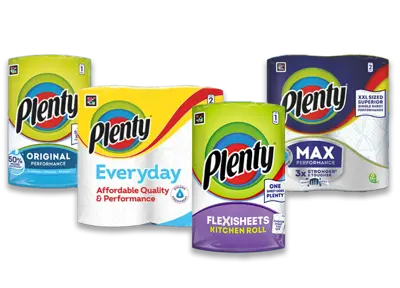1 person found this helpful

Whether you do your shopping online or in person, putting together an essential shopping list simplifies the process. Not only will you get all the groceries you need, but your food shopping list will also save you time and money in the long run. From checking what you already have at home to making a meal plan, give our shopping list tips a try, and make life that bit easier.
Make a weekly meal plan for your weekly shopping list
Creating a meal plan is one of the easiest ways to structure a typical shopping list. Then you can organise your shopping around the meals and snacks that you plan to eat during the week. Here’s how to create a meal plan for your grocery shopping list:
- Make sure you write down your meal plan. Once you’ve written down a meal plan, you’re far more likely to stick to it than if it’s just a few ideas in your head. This makes grocery shopping more targeted and streamlined.
- Get the kids involved. If you’re planning meals for the whole family, be sure to get everyone involved. That way everyone has a chance to choose their favourite meal, and you’re less likely to end up with food waste making meals no one wants to eat.
- Plan in dishes you can cook in bulk. Cooking in bulk allows you to prepare meals for another day which can be stored in the fridge or freezer. This will not only save you time, but also money.
- List what you need. Write down the ingredients needed for each meal on your weekly meal plan, so you know exactly what to check for at home and at the store.
- Use your list of ingredients to check what you have at home. It’s likely that you will have a few of the ingredients you need already in your cupboards, from salt to a tin of chopped tomatoes. Check what you have before you create your shopping list.
- Don’t feel the need to plan 3 meals a day. You may be surprised to discover that eating 3 meals a day isn’t actually that important.2 Instead, focus on eating when you’re hungry, eating healthily, and avoiding huge portion sizes.
Check out our printable shopping list below and take advantage of this to keep your routine well-organized and save time and money.

Consider a balanced diet when planning your food shopping list
Being able to achieve a balanced diet is key to staying healthy,1 whether you’re planning meals for children or adults in your household. Make sure you’ve got all the important food groups accounted for when you’re creating your weekly shopping list:
- Carbohydrates: bread, pasta, potatoes, cereals or grains make up a key base for most meals.
- Fruit and veg: Make sure you aim to include the right number of portions of each food category. This includes 6-11 servings of bread, cereal, and pasta, 5-9 servings of fruit and veg.
- Protein: Whether you’re an omnivore, a veggie or a vegan, you need your protein! You’ll get this through meat, poultry, nuts and beans – and dairy products like milk, yoghurt and cheese.
- Sweet treats: sugary snacks are always nice to have in the cupboard, although they’re best enjoyed in your diet (and grocery shopping list!) sparingly. The same applies to fatty and oily foods.
Use up something from home to eat before you head to the shop with your shopping list. Heading out for groceries with a hungry belly is a recipe for disaster and leads to more impulse buying.
Why you should check what’s already in your home when writing your shopping list
Now you know what you’re going to eat for the week, it’s time to draw up a grocery shopping list. There are a few of reasons it’s worth checking your fridge, freezer, and cupboards before you start filling up your food shopping list:
- A quick stock-check can save you money, time, and hassle, so don’t just stock up on the usual ingredients.
- When you check what you’ve got and haven’t got, you’re less likely to miss something important out from your shopping list.
- This is a great way to ensure you reduce food waste.
- By making sure you stick to your shopping list after checking what you already have, you can feel confident you’re buying exactly what you need.
- Checking your cupboard is a great way to ensure you don’t forget the non-food items needed on your essential shopping list. Don’t forget to check if you need any more washing up liquid, laundry supplies, loo rolls, and absorbent kitchen towels like Plenty The Original One.
Tip
Why not add a little note bad to a notice board or your fridge? When you notice that you have run out of something, add it to the note pad. This will make your life so much easier when it comes to drawing up your weekly shopping list.
Set yourself a budget for your weekly shopping list
Making a list to get everything you need is one thing, but tracking your spending is another. With the cost of living rising, how to avoid overspending with your weekly grocery list?
- Set a budget. To do this, take note of your income and regular outgoings and work out a reasonable budget for the weekly shop.
- Try to stick to the budget you set. Using the tips above such as meal planning and ensuring you don’t double up on things will help with this.
- Try to avoid eating out or ordering in a takeaway unless you have included that in your budget. Not only will these cost you more than cooking at home, but they could lead to food waste if you are using a meal plan.
- It’s a good idea to add in a little contingency – you can always balance the books in the following weeks if required.
- Don’t forget to make the most of coupons and loyalty schemes. Not only do supermarkets provide customers with money off and extra points, but some will allow you to exchange the points for other things such as family days out saving you money in other areas of your life too.
Using our shopping list template, as well as learning how to freeze and safely defrost bread, meat, vegetables, and more are great ways to help you save money and reduce waste too.
Now, with these tips, shopping smart is easy. Put our grocery list into action and you’ll not only be making your life easier, but you could also save a few pennies in the process too.
Sources
Related articles
2 easy ways to make homemade musical instruments for kids
Looking for easy ways to have fun with your kids while teaching them how to recycle? Learn how to make musical instruments from waste material.

Why is my cat being sick? Symptoms, causes, and solutions
“Why is my cat sick?” Learn about the signs of illness in cats, the reasons why your feline friend might be sick, and how to treat a sick cat at home.

How to save money at home: simple saving tips and budgeting tips
Looking for simple ways to save money at home? Follow our budgeting tips and saving ideas to help you save money and provide more for your loved ones!

How to speed up composting: 10 hacks to accelerate your compost
Are you looking for ways to speed up your compost? Discover how to accelerate compost with our 10 hacks. Accelerating your compost has never been easier!

What to do with leftover food: creative ways to use food leftovers
From leftover chicken ideas, to what to do with leftover rice, find out how to get the most from your food leftovers.

Shortage of water: what is water stress and what can we do about it?
What is water stress, and what can we do to reduce its impact? Learn about water stress, its definition, causes, effects, and how to help water scarcity.



